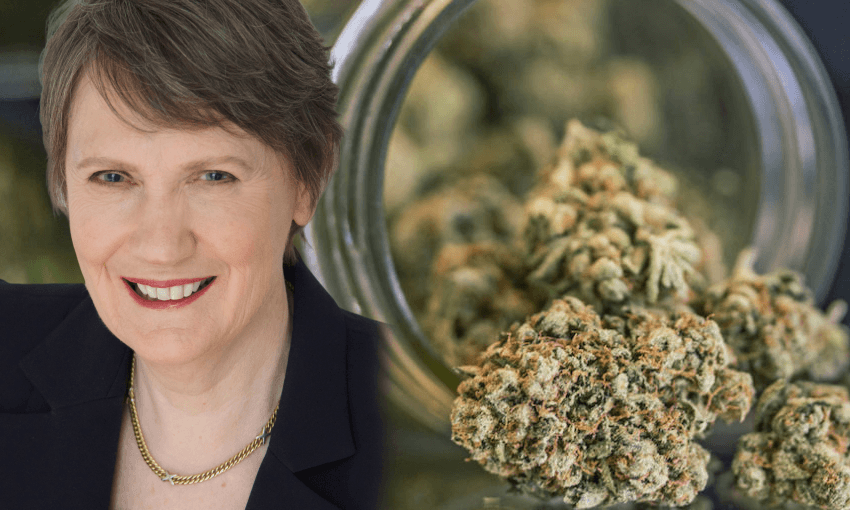Former prime minister Helen Clark has called for New Zealanders to vote yes when they hit the booth in next year’s cannabis referendum.
Former prime minister Helen Clark says New Zealanders should vote yes to the legalisation of cannabis and the wiping of minor cannabis-related convictions at the 2020 cannabis referendum. The recommendation comes off the back of a report released by her foundation, The Case for Yes.
“If you go back to 1994, in a speech that I gave at the time on cannabis, I took a position then that was based on what the Department of Health had been telling me, which was this shouldn’t be criminalised,” she told The Spinoff. “And so I took a stand on partial decriminalisation or partial prohibition. But my thinking has changed.”
Today, more than 80% of New Zealanders will try cannabis before the age of 25, said Clark, and irregular policing and systemic racism means it’s Māori who disproportionately suffer the most at the hands of the law. Therefore, legalisation is preferable to decriminalisation as it avoids the racial pitfalls of a system based on discretion.
The Misuse of Drugs Amendment Act that was passed in August goes some way in doing this, but Clark said it still has two issues.
“One, it leaves supply criminalised, and there’s often quite a fine line between possession and supply – there are plenty of people who end up in jail for supply who were actually just in possession.
“And secondly, there’s discretion, and as our paper points out, we have a huge social justice inequity issue on discretion because we see with cannabis – as with everywhere else in the criminal justice supply chain – Māori disproportionately are arrested, prosecuted, convicted and receive custodial sentences.”
Clark attended the launch of the Global Commission on Drug Policy in Portugal in June, and its 2019 report, Classification of Drugs: when science was left behind, set out the case for the rescheduling of drugs like cannabis. Currently, scheduling has little to do with the science of potential for harm, said Clark, and means relatively benign substances can still have proportionally severe penalties.
“It’s not based on science at all, because we have legal drugs that are highly dangerous and scheduled differently to ones like cannabis which are not particularly problematic.”
“This is a huge issue, one that Kelvin Davis is trying to tackle within the boundaries he’s got, one that Andrew Little is trying to tackle too. Penal reform is a huge issue. But I think if we can get a grip on drug policy that will also help us get our prison numbers down and deal with the social justice issue of the high criminalisation rate of Māori.”
New Zealand has a history of expunging unjust laws, Clark said, and there is little reason not to do so here – particularly given the high rate of cannabis use across all socio-economic demographics.
“There has now been expunging of convictions under the old indecent behaviour legislation which restricted men having sex with men because that was just so unjust. So I think the same principle applies here that people should have their records expunged. Convictions like this end up on people’s records, they can stop you entering other countries, you have to disclose them to employers in many cases – it is a blight on your record.
“I think the use has been so widespread that the attitude I hope Kiwis will take is that if they are one of the 80% who have or will use cannabis, then there for the grace of God go I, and they’ll think about how a conviction would have affected them, and realise that it’s not right that that should stay on your record.”
However efforts should be taken to avoid a Colorado-style commercial free-for-all should cannabis be legalised, the report by her foundation argues. Plain packaging, health warnings and restrictions on advertising should be a starting point, but a state monopoly like that of Uruguay could be going too far.
“I think a key objective should be not to create another big alcohol or big tobacco. I would base it on our current tobacco legislation. We should start like that and keep it under control.”
The report comes at a time where a successful yes vote looks increasingly unlikely as the anti-legalisation movement ramps up. Polls in June and August showed falling support for legalisation, with the latter suggesting the referendum was on track to fail.
“The Prime Minister has a lot on her plate, as all prime ministers do, so [increased lobbying] is going to be up to her,” said Clark. “Clearly you’ve got the minister of justice and the minister of health who are outfront saying we’re going to advocate for this. I think that if you go back to last year the polling showed a clear majority saying yea, why not, and then in recent weeks and months the anti campaign has geared up of course – fear and smear and scare, [groups like] Family First will distort what you wouldn’t even call evidence, they’ve just got a line – but the other side will come back and do a good job.
“I think it’s very important to keep it cross-party. There are elements across all the parties who are very supportive of this, so to me it’s not a left-right issue, it’s not Greens versus anybody else issue, it’s an issue of public policy which should be dealt with in a rational way.”



